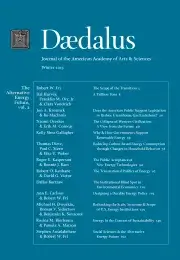The Transnational Politics of Energy
Creating effective energy policy is hard, in part because it often requires effective international coordination. For most salient energy-related issues – such as control of the emissions that cause global climate change or the building of stockpiles to make oil supplies more secure – international coordination is inherently difficult. Solutions lie in making these problems more manageable by working in small groups of relevant countries; successful cooperation also hinges on finding incentive-compatible commitments that align, to the extent feasible, with national interests and are focused on areas where cooperation will yield tangible joint gains. The outcomes of such cooperation efforts are likely to be decentralized complexes of networked institutions rather than integrated, hierarchical treaties that govern a coherently defined issue-area.
For countries to deal successfully with energy issues, they must engage in international cooperation. This requires being strategic in selecting issues to address. Although domestic politics undoubtedly takes center stage in formulating energy policy, energy markets and environmental problems have both become global. As a result, any nation’s actions to reduce greenhouse gas emissions meaningfully, to secure reliable energy supplies, or to stabilize energy prices will be affected by the actions of many other countries. International considerations raise hurdles in the formulation of effective national policies, but they can also create opportunities. In this essay, we explore when such opportunities can arise, how some hurdles to effective international coordination can be cleared, and how analysts and policy-makers should think about the design and impact of international regulatory frameworks. We argue that the structure of international cooperation on some energy problems, such as climate change, is prone to deadlock. But by recrafting these problems–usually by making them “smaller” and focusing on the areas where national interests are better aligned for international cooperation–participating countries can avoid an impasse.
In the first volume of this two-volume special issue of Dædalus, editors Robert Fri and Stephen Ansolabehere ask, “Why is creating energy policy so hard?”1 Focusing on the United States, they identify a number of reasons, three of which could be summarized as follows:
- Most important, the U.S. public does not want to pay more for energy even though full social-cost pricing is key to a coherent energy policy.
- In particular, the U.S. public does not put significant weight on global warming as a driving force for policy regarding choice of fuels and energy technologies.
- Finally, the competitive and intensely polarized state of U.S. politics means that no policy elite can develop and impose a coherent energy policy without facing the impossible task of appealing to extreme positions while also retaining enough centrist support to achieve policy passage.
The problems are not principally about a lack of scientific knowledge, and they cannot be rectified with research. Instead, the problems are political and, as the first volume makes clear, apparently intractable. Action can be taken at the margin. For example, the Obama administration recently imposed new regulations that make the construction of new coal-fired plants in the United States very unlikely while also creating strong incentives to shut down a large fraction of the existing (mainly older) coal-fired plants. Overall, however, as volume 1 suggests, the political forces needed for major changes in U.S. energy policy are not in place. This second volume, which also focuses primarily on the United States, devotes much attention to the underlying behavioral and institutional forces that drive decision-making and choice. While there are some causes for optimism, this volume echoes the pessimistic message of volume 1.
. . .
